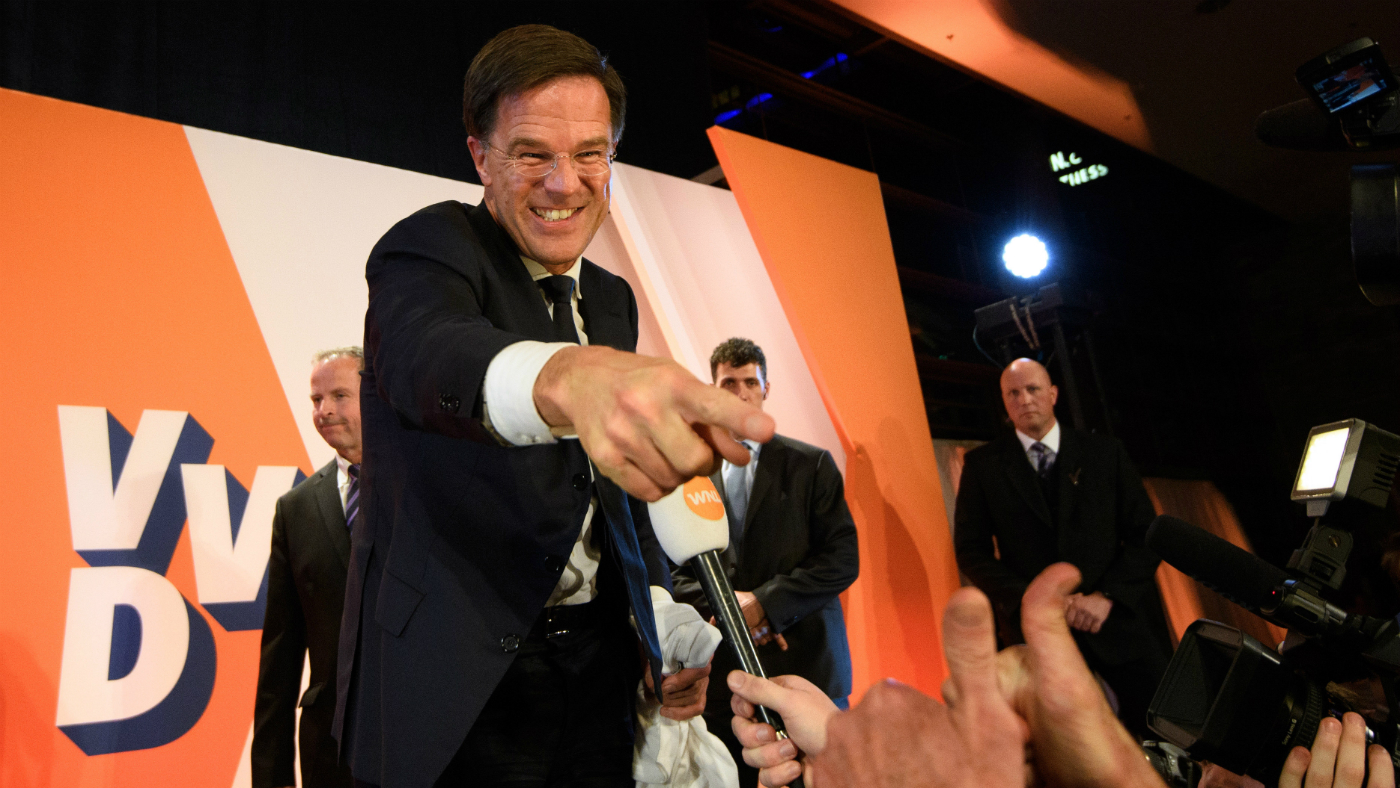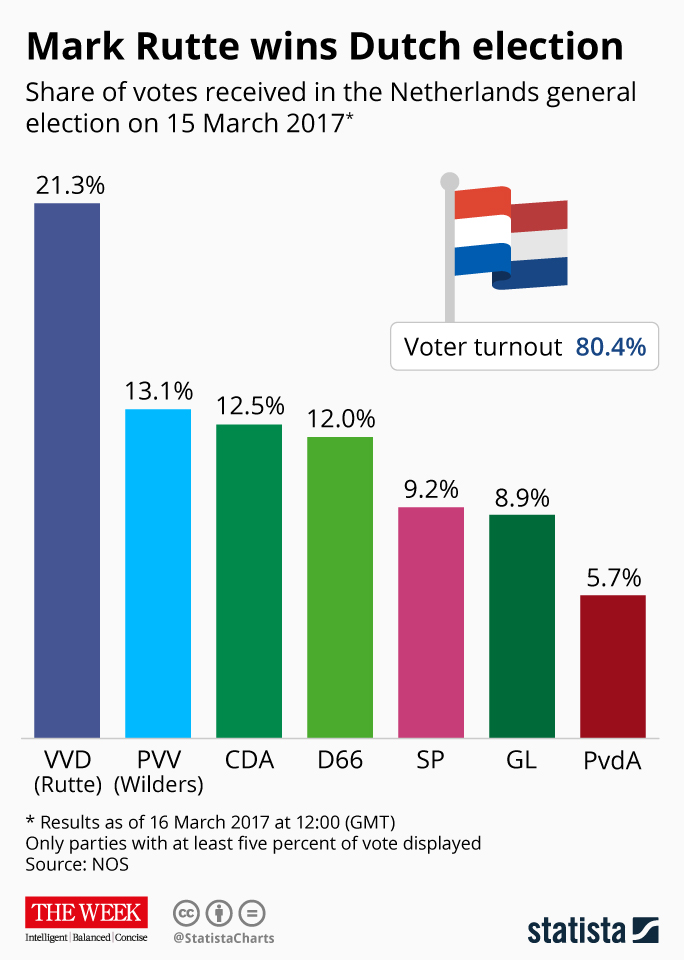What does Dutch election mean for populism in Europe?
Netherlands was a 'litmus test', but France will be the 'bellweather election', say commentators

A free daily email with the biggest news stories of the day – and the best features from TheWeek.com
You are now subscribed
Your newsletter sign-up was successful
Dutch Prime Minister Mark Rutte's victory over Eurosceptic, anti-Islam Geert Wilders comes as a "huge relief to other EU governments facing a wave of nationalism", writes the Sydney Morning Herald.
The Netherlands' election was widely seen as a litmus test for the strength of anti-establishment populism ahead of upcoming votes in France and Germany later this year.
However, says The Guardian, it is too soon to applaud a return to political normalcy.
The Week
Escape your echo chamber. Get the facts behind the news, plus analysis from multiple perspectives.

Sign up for The Week's Free Newsletters
From our morning news briefing to a weekly Good News Newsletter, get the best of The Week delivered directly to your inbox.
From our morning news briefing to a weekly Good News Newsletter, get the best of The Week delivered directly to your inbox.
France holds its first round of general election votes on April 23, with a run-off two weeks later on May 7 if no candidate receives more than 50 per cent support.
According to CNN, a series of terrorist attacks, along with an influx of refugees, has pushed right-wing leader Marine Le Pen into the front.
It will be "the real bellwether election," writes Cornell University's professor Mabel Berezin, adding: "That is where the populist action is and that is what we should be focusing upon."
While Le Pen, the anti-EU leader of the populist National Front, leads in the polls, Francois Fillon will attempt to keep the centre-right vote for the Republicans.
A free daily email with the biggest news stories of the day – and the best features from TheWeek.com
Meanwhile, centrist Emmanuel Macron, a former banker who founded his political movement, En Marche!, two years ago, promising to heal France's ethnic and economic tensions, is hoping to sweep up votes both left and right.

In Germany, however, the sun may have already set on the potential for a populist uprising.
Chancellor Angela Merkel's open-door policy to one million refugees in 2015 led to a huge backlash and a sudden explosion in support for the nationalist, anti-immigrant Alternative for Germany (AfD) party.
But support has dipped and tensions have calmed since a Turkish-EU pact curbed the flow of migrants.
Last month, one German pollster suggested populism's biggest triumph - Donald Trump - may also prove its downfall.
"The chaotic leadership of US President Donald Trump, who was at first celebrated, is tending to cause alarm given the crises around the world," Manfred Guellner told Reuters.
Infographic by Statista.com for TheWeek.co.uk
-
 How to Get to Heaven from Belfast: a ‘highly entertaining ride’
How to Get to Heaven from Belfast: a ‘highly entertaining ride’The Week Recommends Mystery-comedy from the creator of Derry Girls should be ‘your new binge-watch’
-
 The 8 best TV shows of the 1960s
The 8 best TV shows of the 1960sThe standout shows of this decade take viewers from outer space to the Wild West
-
 Microdramas are booming
Microdramas are boomingUnder the radar Scroll to watch a whole movie
-
 Will increasing tensions with Iran boil over into war?
Will increasing tensions with Iran boil over into war?Today’s Big Question President Donald Trump has recently been threatening the country
-
 Corruption: The spy sheikh and the president
Corruption: The spy sheikh and the presidentFeature Trump is at the center of another scandal
-
 Rubio boosts Orbán ahead of Hungary election
Rubio boosts Orbán ahead of Hungary electionSpeed Read Far-right nationalist Prime Minister Viktor Orbán is facing a tough re-election fight after many years in power
-
 Greenland’s capital becomes ground zero for the country’s diplomatic straits
Greenland’s capital becomes ground zero for the country’s diplomatic straitsIN THE SPOTLIGHT A flurry of new consular activity in Nuuk shows how important Greenland has become to Europeans’ anxiety about American imperialism
-
 Epstein files topple law CEO, roil UK government
Epstein files topple law CEO, roil UK governmentSpeed Read Peter Mandelson, Britain’s former ambassador to the US, is caught up in the scandal
-
 Iran and US prepare to meet after skirmishes
Iran and US prepare to meet after skirmishesSpeed Read The incident comes amid heightened tensions in the Middle East
-
 Which way will Trump go on Iran?
Which way will Trump go on Iran?Today’s Big Question Diplomatic talks set to be held in Turkey on Friday, but failure to reach an agreement could have ‘terrible’ global ramifications
-
 Israel retrieves final hostage’s body from Gaza
Israel retrieves final hostage’s body from GazaSpeed Read The 24-year-old police officer was killed during the initial Hamas attack